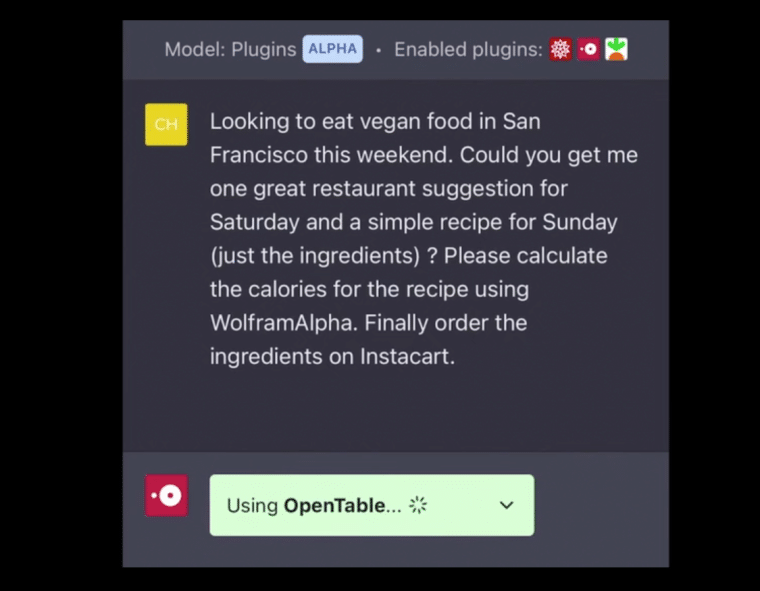
OpenAI is now letting developers plug their systems and databases to feed its popular generative AI solution ChatGPT with today’s release of plugins.
In a blog post published this morning, the company explained how these plugins will function and said that it has already been testing them with a handful of early adopters of its technology including Expedia and Instacart.
Before this announcement, ChatGPT was only capable of answering questions by using the information it was trained on. This dataset was for events that occurred on or before 2021.
Now, with plugins, users can get answers from ChatGPT based on information from third parties. For example, Klarna, a company that has created a ChatGPT plugin, allows users to search and compare prices from thousands of online stores before buying.
Meanwhile, in the case of KAYAK – the popular online travel search engine – the plugin can be used to help customers get recommendations of where and how they could travel based on their available budget.
ChatGPT is Getting Plugged to the Internet
Aside from this, OpenAI has also built a ChatGPT-powered search engine that uses information retrieved via the Microsoft (MSFT) Bing search API to come up with answers to users’ queries.
This represents a significant leap compared to the existing non-connected ChatGPT version that provides answers by using the data it was initially trained on as it means that the AI model will now be able to tap into the vast amounts of information available on the internet to deliver its responses.
OpenAI understands – or at least they think they do – the risks that come with this kind of exposure. For this reason, the company has implemented certain safeguards to deter bad actors from using the software for criminal purposes.
For example, the AI-powered search tool can only retrieve information, meaning that it cannot be instructed to send forms or perform actions. In addition, the AI model is designed to list the sources it went through to come up with an answer to the query.
OpenAI is also launching today a Code Interpreter tool and Retrieval AI tools. The first of these is designed to deconstruct a text prompt into the corresponding line of Python code. This tool can be used for basic programming tasks and should be quite useful to experienced developers to write up the codes for the most basic tasks to be performed by the systems they are working on.
Meanwhile, the Retrieval tool lets ChatGPT access the information from a certain organization including its documents and e-mails so users can obtain answers about any topic that has been discussed or shared between co-workers, research reports, and internal initiatives.
OpenAI and Others are Rushing to Take the Lead in the Rapidly Growing AI Industry
OpenAI seems to be wasting no time to make its AI models available to the masses. For now, these ChatGPT plugins will only be available to a handful of trusted developers and to those who have subscribed to ChatGPT Plus.
Even though the company headed by Sam Altman and partially owned by Microsoft says that it has identified the inherent risks of letting the AI model be connected to external sources, they still need time to make sure things don’t get out of hand.
These announcements are being made roughly a week after OpenAI launched what is, to date, the most powerful AI model they have produced – GPT-4. Multiple companies are already using this model to power features and tools that take their customers’ experience to a whole new level.
It remains to be seen if these rapid advancements in the AI field will be free of negative consequences or unintended use cases as the race to become the leading force in this up-and-coming space is getting more and more heated by the day.
Other Related Articles: